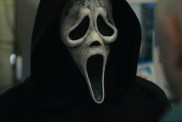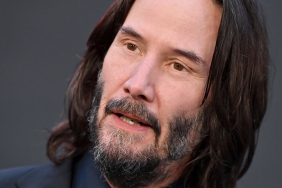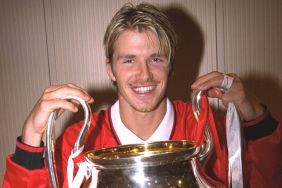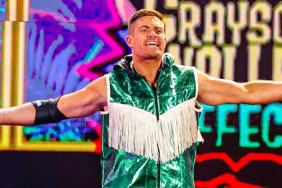Now playing in select theaters, Scenic Route marks the debut feature from the sibling directing pair of Kevin and Michael Goetz and stars Josh Duhamel and Dan Fogler as two best friends trapped in a potentially deadly situation when their car breaks down alongside an isolated desert road.
The film’s first scene reveals Duhamel’s Mitchell, covered in blood with his hair cut into a mohawk, sitting against a barren desert before flashing back to reveal the surprising chain of events that have unfolded to bring him and Folger’s Carter to what may be the final moments of their lives.
ComingSoon.net sat down to speak with both Duhmael and Fogler about the intensely dramatic project, most of which plays out with just the two actors. In the below interview, both men discuss the challenges of acting for full 20-minute takes and doing a small-scale shoot in the middle of death valley. Fogler also offers quite a bit of information on his own upcoming directing debut, Don Peyote, which also stars Duhamel and makes use of his post-Scenic Route mohawk.
CS: How did “Scenic Route” start for you?
Josh Duhamel: Well, the script got sent to me. I read it and thought it was really good. I loved it. It terrified the s–t out of me. It was so dense and so dialogue-heavy, especially at the beginning. It was a big acting commitment. It wasn’t like I got paid anything for it, but the real reason I got into acting in the first place was to play roles like this.
CS: It seems like a really exciting prospect for an actor. It’s sort of midway between a film and a stage play in a lot of ways.
Duhamel: Yeah! And that’s the way we approached it. We had to approach it as if it was a play because, had we not, it just never would have worked. It’s so dialogue-heavy at the beginning and it’s just like performing on stage. With such time constraints to shoot it, we spent weeks in rehearsal before we got out to the desert. It took some time to find Dan Fogler to play the other part, but I’m really grateful that we did.
CS: When did you meet Dan for the first time?
Duhamel: It was probably about a month before we started shooting. We sat down at the Early World Cafe in Brentwood, just us and the directors, and asked him if he thought this is something he could commit to, because this was meant for someone with real commitment and an understanding of the work it would take to pull this off. We didn’t have a lot of time to shoot. We needed somebody who would be ready to hit the ground running. He was amazing. He showed up to rehearsal about three weeks before we started and really just got into it like we did.
CS: What’s the process of building the past character relationships together? In the film, they’ve been best friends for some time
Duhamel: It was really important. That was basically at the center of our rehearsal, finding out how to establish their relationship and the history that they’ve had. I was convinced that, if we could keep the audience engaged for the first third of the movie with all the talking back and forth and the information about the characters’ past, they’re going to love the end. We really had to dig deep. They’re really a mirror of one another. They’re both artists.
CS: So you think that, in some ways, they’re opposite sides of the same person?
Duhamel: Yeah. That’s what Kevin and Mike said a lot. They’re sort of two halves of the same person. Underneath all that resentment that they’ve built up over the years, each one sort of reflects the other. Ultimately, they have a lot of love for each other. They care so much about each other.
CS: How excited were you for the mohawk scene?
Duhamel: That was one of the first things that I really loved when I read it. I thought, “Oh my god. If I do this movie, I get a mohawk!” It was like the cherry on the top of the ice cream sundae. It was a chance for me to get something that I had always wanted. I knew early on it was in script and it was something that I really wanted to do.
CS: Ideally, would your future career have a lot more experimental roles like this?
Duhamel: Absolutely. A couple years ago, I was getting offers on things or interest in things that were similar to what I’d done in the past. I realized that I needed to make some hard decisions about what I wanted to do. I just said “no, no, no,” to so many different things while I was looking for something that would be a change. I really love what I’m able to do for a living. It isn’t about money and it isn’t about fame. It’s about expression. I want to do something different every time out of the gate. I made a conscious effort to start doing things that I think are really special. So the answer to your question is yes, I do really want to do things that will allow me to keep stretching myself, because that’s what ‘s most important. To be creative and expressive.

CS: Have you had any thoughts about jumping on the other side of the camera?
Duhamel: I would love to do that, but there’s so much that goes into directing. It’s a heavy burden to take on. You have to organize a lot of people. You’re constantly being asked what should go where. It can all be fun, but it’s a matter of taking the initiative and doing it. Someday I would like to do it. I love the thought of working with the actors and coming up with ideas and characters and trying to shake out the story.
CS: Dan, how do you recall “Scenic Route” first coming your way?
Dan Fogler: Josh was a producer on it. The Goetz brothers were looking for someone who would be able to, I think, sustain a lot of those long scenes, but also be funny when they needed to be and also be physical and violent. I guess they got it to me. I don’t know, man. I read it and I really dug it. I thought, “S–t, I’d love to do a project like this.”
CS: It seems like the type of project that’s particularly appealing to actors. It very much has a stage quality to it.
Fogler: Yeah, it’s got long, long scenes where you’re walking a tightrope. There’s a lot of dialogue, obviously. It’s just the two of us. I love that. I come from theater. We had rehearsal. You don’t usually get that when you’re doing film. We were really prepared. When you’re really prepared, you get a lot of time to shine because you’re very free. It’s good, man. It’s a great process.
CS: Do you and Josh sit down and work out the specifics of this longtime friendship that your characters have?
Fogler: Yeah. We had a whole rehearsal process for that. We talked about histories a lot and we connected the dots. There was a lot of driving to and from set and we drove around together. We drove up to Death Valley from California. A lot of bonding. There wasn’t much to do out there so, when we were done talking all day on set, we’d talk later at night about all sorts of stuff. It was good. It felt like we were old friends and I still consider him a very good friend afterwards. He did another movie of mine. I directed one that’s going to come out later called “Don Peyote.” I made use of his mohawk in that one. He does a really great character in it.
CS: You’ve had some really interesting projects lately that are all over the map. One of my personal favorites was your recurring arc on “Hannibal.” How does something like that balance against film work?
Fogler: Thanks, man. Bryan Fuller is awesome and I think he wanted to do something with me because he saw me in “Spelling Bee” on Broadway a long time ago. He was trying to figure out a fun part and a lot of the people on that show had the same agent. It was a good opportunity to work something out with a little arc. It was just so fun, man. I loved doing that and working with Mads [Mikkelsen]. He’s so serious on-camera but, when they cut, he’s this hysterical guy from Copenhagen. Then you’re also working with Morpheus! I was like, “Holy s–t! I’m working with Morpheus!”
CS: Now he’s Perry White.
Fogler: Exactly. He’s playing all these iconic characters. I had a great time on that and I want to do different stuff. I want to show a broader spectrum of my abilities. That character was very different than what I’ve done before. He’s very much a kind of eccentric, flamboyant weirdo. I thought, “S–t, that’ll be fun.” I had played characters like him in college, but never on film or TV or anything. That’s the big reason why I wanted to do “Scenic Route” and why Josh wanted to do it, too. To show off a bigger spectrum.
CS: Can you tell me what it was like to meet Kevin and Michael Goetz for the first time?
Fogler: They were both very thoughtful. They seemed like cool guys. The kind of guys you’d want to have a barbecue with or go surfing with. They were these very laid-back guys. I was surprised and I thought, “If these guys are going to do this whole movie, they’ve gotta be the young Coen brothers.” That’s what I was expecting and then, when we got on set — or not even when we got on set — it was from the moment we met them to the rehearsal process. They were so prepared. They really pushed us to be really prepared because they knew that, once we were out there, if we weren’t it was going to be us against the elements. There was also so much dialogue with 17-minute takes and whatnot. It was like little plays. That process was amazing. As someone who comes from theater, you don’t get that in film. A lot of the time, there’s not even any talk about it. You just get up and they expect you to be ready. That’s exciting, too, but in this you get to play with chemistry with the other actor. It’s great. They were amazing and, once we were on set, they really worked with each other really well. They would finish each other’s sentences. One is a little more technical and one deals with the actors a little bit more. It just felt really smooth for something that was out in the middle of Death Valley with no budget.

CS: Did the unique set-up let you shoot in sequence?
Fogler: Yeah, we had to. Mostly because the mohawk was the point of no return. Once he had that, there was no going back. There’s the title of the article, right there: “Mohawk: Point of No Return”! But it was great. It was like a play. It was just progressing over and over. A lot of times, movies are tossed together like a salad and then put together like a puzzle.
CS: Is there anything definitive that you can point to that’s different about how you might approach acting in something like this to acting in something that you know is going to be filmed out of sequence?
Fogler: Well, there’s no stopping and starting is the biggest difference. If something happens, you just go with the flow. It’s very much like theater. You’re doing these long takes. The long dialogue scenes we were doing in the movie would become these 20-minute takes. If you did a scene like that in a bigger budgeted movie, it might take you two or three days to shoot. You’d be working on that one scene for three days. That’s how slow the process is. You can imagine how, if you have to cry throughout the scene, you’re crying for three days, pal. From eight different angles. It’s its own crazy torture. It all ends up flowing together, but you’re trying to find these little tiny perfect moments. It’s tough.
CS: Do you find yourself going back and studying similar approaches to storytelling in classic films? For this, Alfred Hitchcock’s “Lifeboat” seems like a good comparison.
Fogler: Oh, f–k yeah. I’m always inspired by other films. Films inspire my work as a director and as a writer, too. I love movies. I always pay homage and steal from other things. I always have homages in my films. Certain lines said certain ways. Costume pieces. Winks. I always wink. I know I’m not supposed to, but I love to do it because that’s what keeps it kind of magical, for me at least.
CS: When are we going to start seeing more about “Don Peyote”?
Fogler: We finished it and we’re about to sell it, man. It’s going to be out, knock on wood, by the end of this year, I think. Josh is in that and I made use of his mohawk. He plays like a freegan in it. He’s a Mad Max kind of guy who lives off the grid. He’s very cool. I play this guy named Warren Allman, who is kind of this Woody Allen everyman. He gets swept up in conspiracy theories and trying to figure out the world and figure out himself. He goes nuts and tries to become like a self-proclaimed prophet. He becomes Don Peyote. It’s like “Easy Rider” meets “Fear and Loathing in Las Vegas” meets an early Woody Allen movie. Obviously, it’s got a lot of homages to the kind of stuff I love in it. It’s very experimental. It’s got an amazing cast.
CS: Is directing an ultimate goal for you, or something that you want to balance with acting?
Fogler: It came out of necessity. I made little films when I was in college and when I was a kid. Little Kung-Fu movies and stuff. I always had fun, but it’s always so much work. I’d much rather act. It came out of necessity where I wasn’t getting the parts I wanted. I wanted to do stuff where I, especially with “Don Peyote,” could write to my abilities as an actor. I basically do everything I possibly can in “Don Peyote”. That’s a big reason why I made it and why I did “Scenic Route,” to stretch some acting muscles. I don’t want to get stuck or pigeonholed and I know Josh doesn’t want to, either. I think people are going to see some really new stuff from “Scenic Route” from Josh and also in “Don Peyote.” You don’t even recognize him in “Don Peyote.” He’s more of an ugly character, which is really cool.
CS: Is there a dream role for you as an actor?
Fogler: I love [Jack] Nicholson and I love [John] Belushi. I feel like I have accents of those guys inside of me. I’ve always wanted to do a “One Flew Over the Cuckoo’s Nest” kind of role. I love antisocial characters because those are the most interesting to watch. They do and say things that you wish you could do. I love sad clown characters because you can basically do the full spectrum of your abilities in one part. Those kind of roles. Also, I’d love to be in the new “Star Wars” movies. If I could be Dan Solo, I’d be very happy.
CS: Is that Han Solo’s son?
Fogler: His cousin or something.









